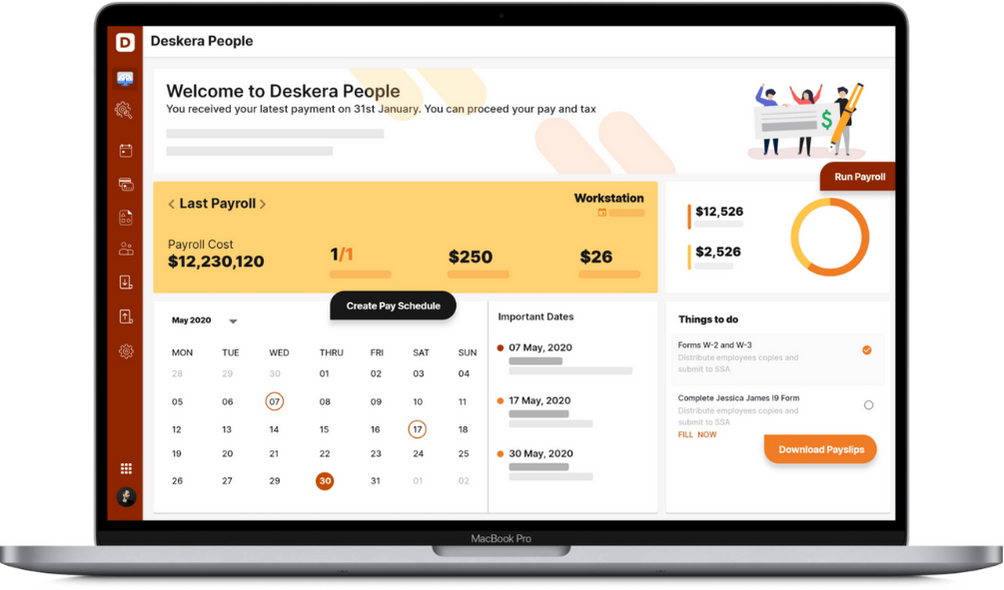According to the Small Business Association, Michigan has approximately 870,000 small enterprises, accounting for 99.6% of the state's total firms. Whether you're planning the next big coney dog stand or designing Red Wings t-shirts, one thing that all small businesses have in common is that they all have to deal with payroll taxes.
If you are employed in Michigan, you will be liable to pay payroll taxes. As a part of the Internal Revenue Code, every employer must withhold federal income tax from the employees and then pay the payroll taxes directly to the Government of Michigan.
Payroll taxes are a financial burden for any firm or business since they have a substantial impact on the business's operating costs. As a result, every business owner should be well-versed on payroll taxes and how to compute them! We've put together everything you need to know about calculating Michigan payroll taxes for your small business in this piece. We'll talk about:
- What are Michigan Payroll Taxes?
- Michigan Payroll Tax Registration
- Get an EIN
- Register with the Department of Treasury
- Filling of Withholding Forms
- How much is the Michigan income tax rate?
- Who needs to pay Michigan income tax?
- Michigan Payroll Tax Withholding and Filing Requirements
- Payment Schedule for Withholding Taxes
- Michigan Unemployment Taxes
- Conclusion
- Key Takeaways
Every employer in Michigan is subject to one or more kinds of payroll taxes. This guide will come at your disposal and help you understand the components of your payroll taxes to have a fair idea if the entire tax system that your company manages is working fine.
This guide will help all the employers in Michigan understand the policies and rules that govern payroll taxes. It will cover everything you need to keep the taxation system in place for all your employees.
What are Michigan Payroll Taxes?
Payroll taxes are taxes withheld from employees' paychecks and paid on their behalf by their employers. Payroll taxes are used to pay for government programmes such as Social Security and Medicare.
The exact amounts of withholding are determined by tax rules and the income levels of your employees. Employers must withhold federal income tax from their employee's paychecks and remit it to the IRS or the Internal Revenue Services. Employers may withhold state income tax from an employee's paycheck in some instances. This, however, varies by state.
Illinois, Indiana, Kentucky, Minnesota, Ohio, and Wisconsin have reciprocal agreements with Michigan. Employers in Michigan are not required to deduct Michigan income tax from wages paid to citizens of other states.
Other out-of-state employers with Michigan employees must register with the Michigan Treasury Department and withhold Michigan income tax from all employees working in the state.
Pre-tax benefits, such as FSAs, HSAs, and retirement savings accounts may be available to some of your employees. Before applying federal payroll taxes, you must remove their contributions to these accounts from their gross salary.
Employee compensation, such as salary, bonus, vacation allowance, and commission, is subject to withholding by employers. Michigan follows federal law if withholding is needed on fringe benefits like deferred compensation plans and cafeteria plan payments.
Any person or organisation for whom a person performs any service as an employee is considered an "employer." Any individual or organisation that pays a former employee remuneration after their employment has ended falls under this category. An "employee" is a person who works for a company that decides what gets done and how.
Michigan Payroll Tax Registration
Withholding a part of your employees' salary is mandatory if your business is based in Michigan. Listed below are some of the rules and requirements that you must keep in mind while you withhold taxes from your employees:
Get an EIN
Suppose you have a business set up in Michigan and have employees from all around the United States working for your company. In that case, you will have to get an employee identification number or EIN from the state. It would help if you kept in mind that the sooner you get your EIN, the better it would be. Ideally, it would be best to get it before hiring your first employee.
The authority that gives out the EIN is the Internal Revenue Service. Different states have different policies for EIN, and in some cases, other ID numbers are given out to employers for withholding taxes. In the case of Michigan, only one EIN is given out to the employers; however, different accounts are created for unemployment insurance and different corporate ID numbers for those businesses registered with the state. Without an EIN, you will not be able to register for withholding taxes.
Register with the Department of Treasury
You must additionally open a Michigan withholding tax account with the Michigan Department of Treasury in addition to your EIN (DOT). You create an account by registering your company online or on paper. Use the Michigan Business One Stop website to register online. Use Form 518, Registration for Michigan Taxes, to register on paper. The DOT does not charge a fee to register your business.
Filling of Withholding Forms
All new employees for your company must fill out the federal Form W-4 and the Michigan Form MI-W4, Employee's Michigan Withholding Exemption Certificate. The DOT website's withholding tax forms area has blank Form MI-W4s available for download. The completed forms should be kept on file at your company and updated as needed.
How much is the Michigan income tax rate?
Michigan is a state where everybody is taxed at the same rate irrespective of their incomes. As per federal law, employers have to withhold 4.25% of the gross salary of all the employees working under them in Michigan.
Employers in Michigan must withhold and remit state income tax from their employee's paychecks to the Michigan Department of Treasury.
Illinois, Indiana, Kentucky, Minnesota, Ohio, and Wisconsin have reciprocal agreements with Michigan. Employers are not obligated to withhold Michigan income tax from wages paid to non-Michigan residents in Michigan.
Other out-of-state enterprises with Michigan employees must register with the Michigan Treasury Department and withhold Michigan income tax from all workers in the state. On the first $137,700 earned, the Social Security FICA tax is calculated at 6.2 per cent, with a maximum amount withheld of $8,537.40. The FICA tax on all wages is determined at 1.45 per cent for Medicare (Hospital Insurance).
Unemployment insurance contributions by employers range from 0.06 per cent to 10.3 per cent. Employers who are new to the market must also pay a fixed fee of 2.7 per cent. The new construction business pays a flat rate of 8.2 per cent to its employees.
In Michigan, some cities collect their income taxes. These range from 1% to 2.40 per cent for residents, with non-residents who work in those cities paying half the resident rate, resulting in local income taxes ranging from 0.50 per cent to 1.20 per cent for these non-resident workers.
Who needs to pay Michigan income tax?
If you have income from a Michigan source, you must file a Michigan tax return. This is true whether you live in Michigan full-time or part-time or live elsewhere but earn money from a Michigan source.
Status of Residency
If you meet the following criteria, you are considered a resident:
- You are a full-time resident of Michigan
- If you live in Michigan for part of the year
If you are a resident of Michigan and earn money in Illinois, Indiana, Kentucky, Minnesota, Ohio, or Wisconsin, you have to pay Michigan income tax.
Michigan Payroll Tax Withholding and Filing Requirements
Employers are responsible for a variety of payroll tax obligations, including withholding and remitting state income taxes and paying unemployment tax. Employers in Michigan must also provide workers' compensation insurance.
The personal income tax laws in Michigan are comparable to those in the United States. There are, however, some distinctions:
Personal exemptions for taxpayers and their families are allowed under Michigan law, but the monetary amount of each exemption is determined by taxable income. In addition, the state provides a basic deduction based on taxable income.
Non-residents who work in Michigan must pay state income tax on the salaries they earn there. Residents who work in other states may be eligible to seek a reciprocal agreement to avoid paying state income taxes in their home state.
Payment Schedule for Withholding Taxes
In Michigan, you can withhold taxes annually, monthly or quarterly. The duration for which you withhold your employees' salaries will determine what your payout schedule will look like. You'll have to make withholding tax payments more frequently if you withhold more.
The specific cash amounts for the various payment plans and other requirements may vary over time, so you should check with the DOT at least once a year for the most up-to-date information.
The following are the payment schedules' due dates:
- Monthly: Payments are due on or before the 20th day of the month following the month in which the tax was withheld unless otherwise specified
- Quarterly: Payments are due quarterly on or before the 20th of the month after the quarter's conclusion
- Annual: Payments must be received by the end of February each year
The due date is extended to the following business day if the payment is due on a Saturday, Sunday, or holiday.
The DOT should send you a booklet containing withholding tax returns and vouchers when you make payments. Form 5080 (quarterly and monthly payments) or Form 5081 (annual payments) will be used, depending on your payment plan (annual payments).
Michigan Unemployment Taxes
If you are an employer who runs a business in Michigan state, you must pay Michigan Unemployment Taxes. The primary purpose of this tax is to support the employees if they get laid off in any circumstances.
The unemployment tax rate in the state of Michigan is 2.7 %. In years three and four, the unemployment rate is determined using your company's taxable payroll and benefits paid to former employees. Your rate is mostly determined by your salary and unemployment benefits beginning in year five, calculated using a Michigan-developed formula.
In other words, firms with a large number of employed workers pay a higher unemployment tax rate than businesses with a small number of employed workers.
Conclusion
It's critical to understand how payroll taxes operate if you work in Michigan. Employees who violate the law may face hefty fines and penalties, and this consequence should not be taken lightly. Thankfully, there are numerous services accessible to assist you. Take the time to educate yourself about payroll tax deductions, exemptions, and rates, so you don't end up paying the penalty.
According to the withholding schedule, all the employers must withhold taxes on time and then submit them to the state. You must know the process of registering your company for withholding taxes as only then you will be able to make payroll taxes payments on time.
How Can Deskera Assist You?
As a business, you must be diligent with employee leave management. Deskera People allows you to conveniently manage leave, attendance, payroll, and other expenses. Generating payslips for your employees is now easy as the platform also digitizes and automates HR processes.

Key Takeaways
Payroll tax is an unavoidable evil that all employers must comply with. The information provided here will assist in ensuring that adequate payroll taxes are paid on each employee. Still, there is always the possibility that these regulations will alter in the future. Any changes to these regulations may and should be constantly monitored to ensure that you, your staff, and the necessary government agencies are all in compliance.
- Michigan income tax withholding
- Michigan payroll taxes
- How to register your business with the state
- How to submit and pay Michigan payroll taxes
The guide also covers essential information on the income tax rates that prevail in Michigan. Michigan follows a flat-rate tax system where all the employees must pay 4.25 per cent of their gross income.
However, some cities levy an additional income tax on residents that ranges from 1 per cent to 2.4 per cent. And non-resident workers pay about half of this amount, which ranges from 0.5 per cent to 1.2 per cent.
The guide also talks about the payment schedule of the withholding taxes and how these taxes can be paid to the government either monthly, quarterly or annually, depending on how the company has withheld the amount. It is always better to stay on track for essential payments like payroll taxes.
Also, all employers have to withhold a certain sum of money as unemployment tax. These sums go to the unemployment account to secure the employees in case of an unexpected layoff from the company.
Related Articles











